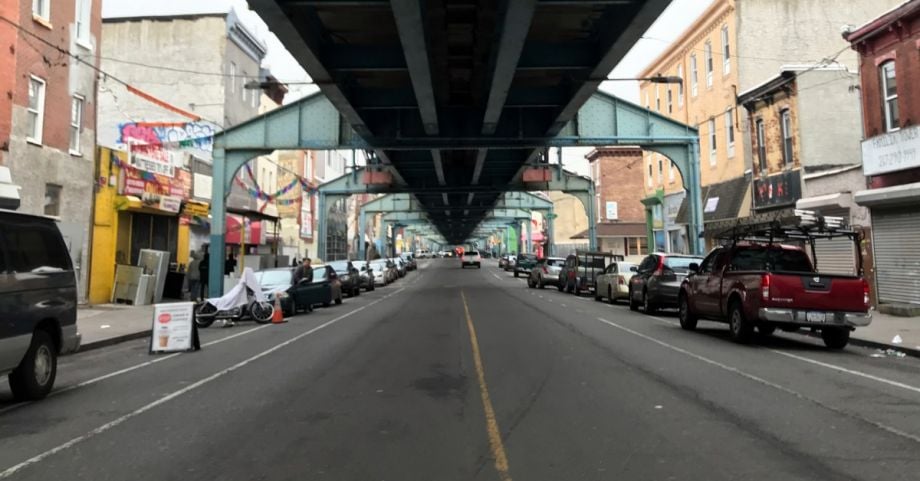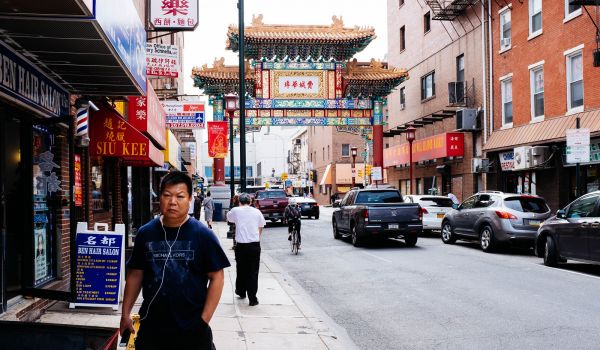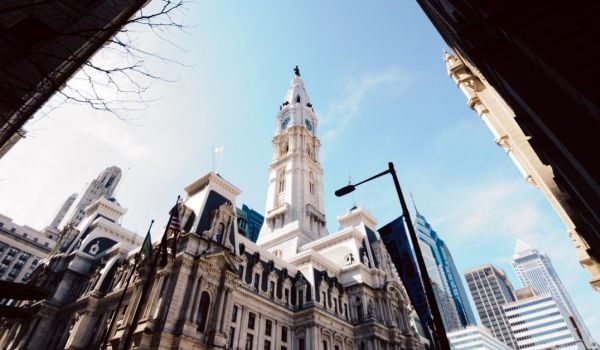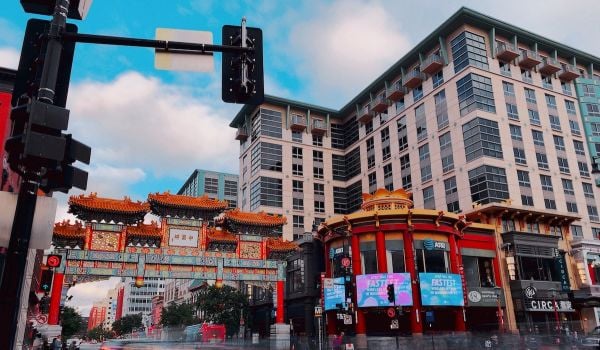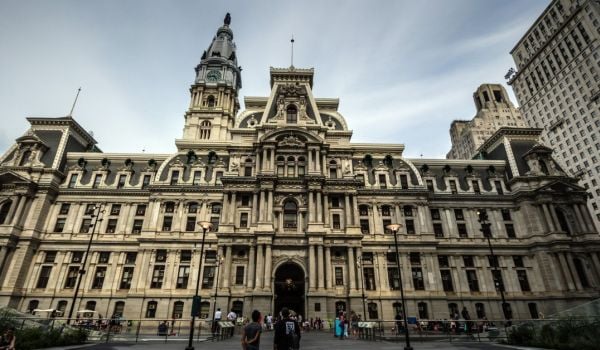Think of all the unexpected phrases that defined the past year. Wear a mask. Wash your hands. Social distancing. For Adriana Abizadeh, that list includes “highest and best use” — the phrase often uttered by real estate developers and urban planners as their end goal for every plot of land in a city.
She’s heard the phrase over and over at virtual workshops on real estate and development, which she’s been attending since the community organizer with some community development experience came on board last March as executive director of the Kensington Corridor Trust — a commercial real estate trust that formed in 2019.
“I’ve heard that more times in the last year than any other time in my life,” says Abizadeh. “They mean whatever’s going to make them the most amount of money regardless of impact on the neighborhood.”
The Kensington Corridor Trust has acquired nine properties since inception, all of them currently vacant lots, with five more properties under contract for acquisition. The corridor runs through an area that was once an industrial powerhouse, with thousands of workers living in Philadelphia’s famous rowhouses and walking to work in massive industrial buildings nearby, many of which are still standing. Black families moved in at the tail-end of the Great Migration in the 1950s-1960s, and white flight ensued. Redlining and job loss from deindustrialization prevented many of the Black families left behind from becoming owners, and the built environment steadily crumbled.
Today the racially diverse area has become known as the regional epicenter of the opioid crisis. The massive industrial lots were ideal settings for open air drug markets, first speed, then cocaine, then eventually heroin.
“A lot of people when they hear about Kensington, they really only talk about the blight, they talk about the opioid epidemic,” says John Chun, a board member of the trust and family owner of J&J Restaurant, right along the corridor. “It’s sad but it makes it hard for outsiders to see the regular working people, the community.”
But outsiders do see the properties along the Kensington Corridor, which is also just a few stops from Center City Philadelphia on the city’s Market-Frankford Elevated subway line. Rents in the area that a year ago ranged from $550 to $1,995 a month, according to Zillow, are today $720 to $2,500 a month. The speculators are coming and they know what they want — “highest and best use.”
The Kensington Corridor Trust wants to beat those speculators to the punch, taking properties off the market for speculation permanently and ensuring that they always provide benefits for the working-class community that calls this corridor home. What those benefits look like may evolve over time, which is why Abizadeh has also been spending a lot of her time working on the governance structure of the trust, as well as building a pipeline of potential board members from the community. Two more community members are coming onto the board next month, and two more in the fall, giving community members a majority of board seats by the end of this year.
Trusts aren’t new to real estate, or to community development. There are community land trusts and other structures like the East Portland Community Investment Trust or Nico, a REIT with some community ownership. The Kensington Corridor Trust is a little bit different in that it’s warehousing properties before it has had the opportunity to engage the community in what it wants to do with those properties, and in every case so far, there aren’t any existing businesses or tenants to preserve — its acquisitions have been vacant lots or condemned buildings that have since been demolished.
But the goal is to create something the community wants and controls. Says Abizadeh: “One of the things we say to introduce the trust is, ‘property by property we’re moving to a world where the neighborhood has control.’”
It didn’t look at first to everyone like the neighborhood had true control of the Kensington Corridor Trust. While it had some founding board members from the neighborhood, the lead co-founders also came from outside the community — mainly Brian Murray, the founder of Shift Capital, a Philadelphia-based real estate development firm that Murray likes to describe as an “impact real estate firm,” looking to repurpose mostly former industrial properties for community benefit in disinvested communities.
Shift Capital has acquired a number of properties up and down Kensington Avenue, including a large former textile mill it converted into the “J-centrel” building, noted for offering tenants monthly rent discounts in exchange for volunteering at organizations in the neighborhood. One also can see the trademark bright turquoise “Shift Capital” signs hanging from smaller but still vacant buildings up and down Kensington Avenue, beckoning new tenants. And they aren’t the only ones.
“As a small business you see a lot of changes going on in the neighborhood,” says Chun. “But you never really got to put a face to these signs and whether what they were trying to accomplish or what they were doing, if it was for purely monetary gains or if it was trying to uplift the neighborhood.”
But as Shift Capital’s presence and activity along the corridor grew, the neighborhood started questioning Murray about whether the things his firm was doing might actually be paving the way for speculative investors to come in later after conditions improved. Rather than washing his hands of that and telling folks there’s nothing Shift Capital can do about potential speculation, Murray leaned into the conversation, and started wondering if he could also help the community set up a real estate entity to take control of at least some of the disinvested properties along the corridor before speculators did.
Founded in 1974, Impact Services is a Kensington-based nonprofit that provides a traditional array of workforce development programs, housing for formerly homeless veterans, and loans to local businesses. Its CEO Casey O’Donnell also joined Murray as one of the founding board members of the trust. Realizing early on that the community presence on the board needed to be stronger, O’Donnell approached his colleague, Jonathan Arrieta, born and raised in Kensington and now raising his own family in the neighborhood.
“Right off the gate, I told Casey, I don’t trust it,” Arrieta says. “A group of white people buying up properties in my community sounds like gentrification. He was like, ‘that’s why you need to be on the board, because you’ll keep it honest and check all of us. Be as free to be you and as open as possible.’”
So Arrieta joined the board, and the early board meetings, he says, only fueled his skepticism that something like this could truly be of genuine benefit to the community he has known and loved all his life. But at least he had a mandate to recruit more community members to the board. In March 2020, he stopped by Chun’s restaurant, where he was a regular, and asked to see Chun.
“I was actually cooking at the time. I was in the kitchen and my dad opened the door and said Jonathan has a question for you so he came in and was like giving me this pitch about joining the board while I’m kinda chopping it up,” says Chun. “I’m sure I was making some pancakes and eggs.”
Chun was also skeptical at first, even after speaking with Abizadeh and joining the board in March last year.
“Being on this block for nine years, there’s things I have questions about, and some complaints,” Chun says. “It was a unique opportunity to get my voice out there. I didn’t know how much I would be able to contribute, but I wanted to get involved and help in any way that I could. As I was on the board longer, it became more clear what I had to say was important and they wanted to hear it, based on my personal experiences on the avenue.”
Having that community lens has already helped the Kensington Corridor Trust navigate potential real estate deals that might have poisoned its well early on. There was one potential acquisition that the trust passed on, but only after Arrieta weighed in about the broker being known in the community for predatory practices like misrepresenting actual sales prices to property owners and pocketing the difference.
“If we buy from them we’re setting a precedent for what kind of organization we are,” says Arrieta. “I said, ‘I guarantee you that the property owner doesn’t realize the property is being sold for a much higher price to another organization right now. And when we looked into it, we found out I was right.’”
Over time the trust has to decide which properties to acquire, which businesses to recruit as tenants, how much it charges them for rent, which contractors and architects it works with, who it borrows money from, which organizations it partners with to serve its tenants and target population in the neighborhood. The plan was to also spend part of 2020 initiating conversations with the community about what to do with the properties that were slowly making their way into the trust’s portfolio.
The pandemic unfortunately delayed a lot of the community engagement, but Abizadeh is looking forward to re-starting larger group conversations once in-person events can resume safely. In the meantime, the one-on-one conversations with potential board members have still been helpful to give her a sense of what the vision for the corridor could be beyond “highest and best use.”
“For every board seat, we want to have 3-5 potential replacements lined up,” says Abizadeh, who was previously working as a community organizer. “And we are not going to be creating a governing body with 10-15 people sitting around a table making decisions for a neighborhood, we want board members who can be tapping into the larger neighborhood on an ongoing basis to gather feedback on decisions.”
To formalize its governance structure, Kensington Corridor Trust has been working closely with Purpose US, a nonprofit founded in 2017 to advance alternative ownership structures with social purposes — what it calls “steward-ownership.” It recently helped Oakland’s Firebrand Artisan Breads convert into perpetual purpose trust ownership.
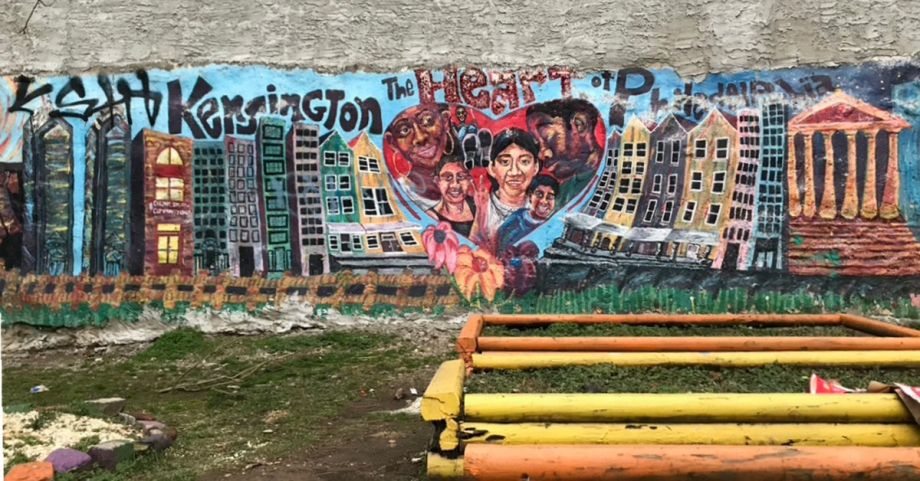
(Photo by Oscar Perry Abello)
Arrieta says the turning point for his skepticism came as a result of Purpose US being involved and facilitating the discussions around governance. “Honestly, before I felt like I wasn’t being heard,” he says.
Purpose US is now also working with groups in Kansas City, Missouri; Tulsa, Oklahoma; and Atlanta on trusts that take real estate out of the speculative market and into irrevocable trust ownership models with some kind of community-based governance structure at their core. Executive Director Camille Canon has been surprised at the ease with which community members have taken ownership over these trust vehicles and the discussions necessary to establish them and get the balls rolling.
“In every conversation we have about governance, people say, ‘it’s just about having the right people at the table,’ which is so so true, you do need the right people at the table and the people who are going to take that responsibility seriously,” Canon says. “But what’s also true, is if you set them up in a system that doesn’t actually give them power, and is designed where the incentives are not fundamentally aligned between their role in that position of power and whatever the business or community is striving to do, it doesn’t work. But there’s something about giving people real power that I think changes how their civic mind works. I don’t have a better explanation than that. Part of the frustration we’ve had in our democracy over the last decade or more has been because we all feel like we don’t have power, and there’s something really powerful to learn about giving people direct power in the community that they live in and a responsibility for what’s going to happen in the future.”
All that said, these vehicles also still need to raise funds for acquisition, demolition if necessary, rehab, construction, taxes and other operating costs until the properties generate enough income from rents to cover everything including debt payments. For now, Kensington Corridor Trust has been borrowing money from foundations at below-market interest rates, expecting that it will allow it to eventually start out charging rents that neighborhood businesses and organizations or residents can afford. It’s also mostly pursuing acquisitions with sellers who are willing to take less than what speculators might give them, knowing they are selling to a neighborhood-rooted entity like this one.
There’s still a huge risk that the trust won’t be able to raise the capital necessary to redevelop the properties in its portfolio. And Abizadeh also points out there’s no guarantee they’ll be able to find tenants that can serve community needs while generating enough revenue to cover rent — even if it’s below-market rent. The trust will be leaning on partners like the city’s Department of Commerce and IF Lab, a business incubator located along the corridor, to help find and incubate those tenants.
As Canon sees it, the payoff could be transformative — a future where real estate trusts like these are in more neighborhoods across the country, whether they’re community land trusts or perpetual purpose trusts or some other alternative form of shared ownership that’s rooted in community and has legal safeguards against speculation. The Kensington Corridor Trust has decided it cannot sell its properties ever, with one exception: if a longtime small business owner, who has clearly demonstrated their commitment to the neighborhood, wants to own their own building as a form of inter-generational wealth, the Trust will sell.
“I think the potential of having more value in the commons and what that does to communities over time alleviates the need to have as much private wealth as possible,” says Canon. “That’s part of the theory of what we’re working on.”
Editor’s note: This story originally misstated that Abizadeh was an organizer in Kensington; in fact, she was an organizer in New Jersey.
This article is part of The Bottom Line, a series exploring scalable solutions for problems related to affordability, inclusive economic growth and access to capital. Click here to subscribe to our Bottom Line newsletter.

Oscar is Next City's senior economic justice correspondent. He previously served as Next City’s editor from 2018-2019, and was a Next City Equitable Cities Fellow from 2015-2016. Since 2011, Oscar has covered community development finance, community banking, impact investing, economic development, housing and more for media outlets such as Shelterforce, B Magazine, Impact Alpha and Fast Company.
Follow Oscar .(JavaScript must be enabled to view this email address)



